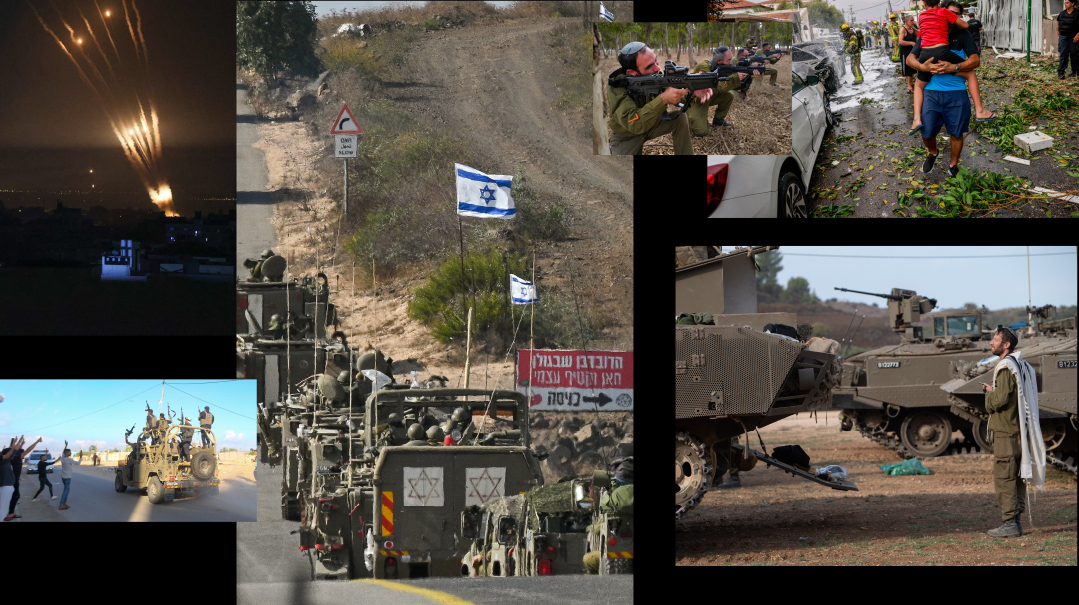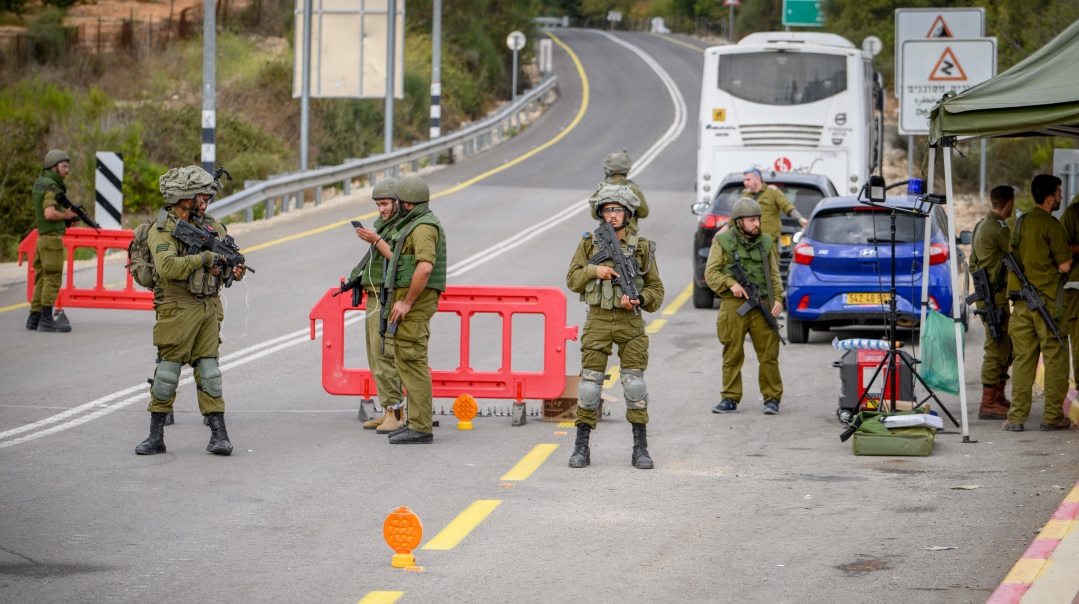Fight to the Finish

Will we succeed in landing a decisive blow against our enemies, and what would an ultimate victory in Gaza look like? Three former National Security Council advisors, and former UN Ambassador Danny Danon, share their views
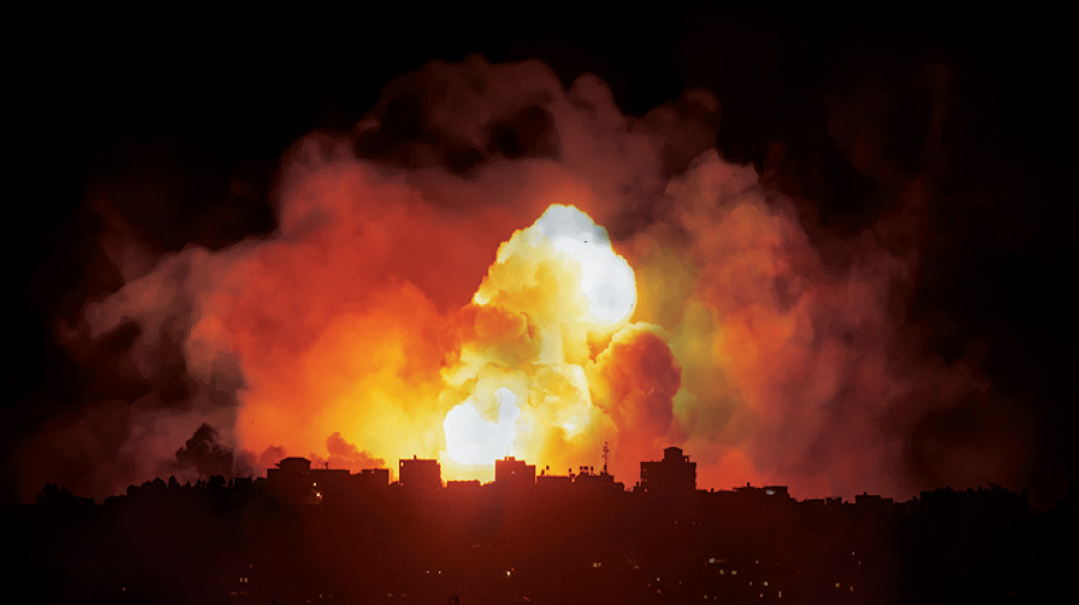
There are more questions than answers as Israel appears ready to embark on a full-scale war that was forced on it in the aftermath of a savage massacre of innocent Jews on the final day of our most joyous holiday. Can another colossal Israeli intelligence failure to foresee this attack be fixed, and if so, when? Will we succeed in landing a decisive blow against our enemies, and what would an ultimate victory in Gaza look like? How long can Israel count on international support? And will this war doom or bloom normalization efforts with Saudi Arabia? Three former National Security Council advisors, and former UN Ambassador Danny Danon, share their views on all this and more.
Israel’s nightmare scenario turned into a rude awakening on what should have been the most joyous day of the year.
For years, security forces have warned the citizenry that Hezbollah was training along the Lebanese border to infiltrate into Israeli territory, capture small villages, and take hostages.
To anyone who lived in a border community and was assaulted by the noise from Hezbollah excavations, such a scenario was not farfetched.
Then, a couple of weeks before Rosh Hashanah, security officials issued hot warnings that terrorists planned to attack synagogues and public gatherings during the holidays. Worshippers licensed to bear arms were asked to bring them to services and inform the gabbaim, who would situate them strategically throughout the shuls.
The ominous warnings proved to be correct, but the enemy struck at a time and location of their choosing. They caught Israel totally off guard on Simchas Torah when hundreds of Hamas terrorists crossed the border of the Gaza Strip at multiple locations, in jeeps, golf carts, and stolen cars with Israeli license plates. Some terrorists even paraglided over the border, an exercise they had been drilling for since 2015.
Some terrorists captured a main IDF military base, while others headed straight to some 20 kibbutzim and towns, breaking into homes and public areas to kill and maim victims and take hostages. Security forces, who were taken by surprise, responded slowly. In the first two days of battle, their goal was to reassert control over towns the terrorists had infiltrated, root out and kill the invaders, and free the hostages they held in Israeli territory. The fate of the estimated 100 to 150 hostages, including an unknown number of dual Israeli-American citizens that Hamas hauled to Gaza, is now out of the security forces’ hands.
In the early days of what may become a long and decisive war, the initial loss of life, the injuries, and the property damage have been unprecedented and devastating. The IDF military censor has been working overtime to control the flow of information from domestic news sources, but anyone who has viewed photos and videos on foreign news sites and social media has found themselves transported back to the darkest days of destruction in Jewish history.
This is a developing story, and at press time, the death toll was headed toward 1,000 — including hundreds massacred at an outdoor party in the early morning hours of Simchas Torah — with thousands more injured.
The terror spread nationwide. Hamas fired at least 3,000 rockets into Israel, toward Jerusalem, Tel Aviv, and its suburbs, during the first 24 hours of their surprise attack. Air raid sirens blared for days on end, starting on Simchas Torah, forcing shuls to finish early, cutting hakafos short, canceling that night’s traditional hakafos shniyos to the accompaniment of musical instruments, and disrupting the simchas hachag for an entire nation, many of whom are strictly Torah observant and remained unaware of the full extent of the catastrophe until nightfall.
Just as the memories of the Yom Kippur War have permanently scarred Israel and are etched into its collective consciousness, it’s hard to see how Simchas Torah will ever be the same again. What’s happening now is especially alarming, coming days after the commemoration of the 50th anniversary of the Yom Kippur War, during which Israelis were inundated with nonstop reporting on the numerous intelligence failures in 1973 that led to initial military setbacks and unnecessary loss of life.
The official panels that will surely investigate last week’s failure will have to wait patiently until the battle is concluded. There will be hard lessons, and unless the current government steers the nation to a smashing victory, it’s hard to see how it can survive in its current form, even though the roots of the current debacle were planted years ago.
“The Hamas attack is the price of failure of the paradigm of restraint, containment, and addiction to calm, which has accompanied Israel since 2009,” said Professor Kobi Michael, a researcher at the Institute for National Security Studies at Tel Aviv University.
It’s part of a disturbing pattern in which both the military and political echelons underestimate the enemy, their will, and their capabilities. Instead, they play a game of charades, with their citizens and the international community, assuring us and them that sworn enemies can be tamed into partners for peace.
“We made a huge mistake in thinking that a terrorist organization can change its DNA,” said Major General (res.) Yaakov Amidror, a former head of Israel’s National Security Council, and now a senior fellow at the Jerusalem Institute for Strategy and Security. “Once a terrorist organization, always a terrorist organization, and the world must act against terrorist organizations.”
Speaking on a Zoom call to foreign correspondents stationed in Israel, Amidror added that the enemy has also miscalculated and has fundamental misunderstandings of the will and capabilities of democracies, such as Israel.
“They thought that if they leveled a hard enough blow, Israel would capitulate and offer concessions,” Amidror added. “What they don’t understand is that in a democracy, if certain lines are crossed, it makes us more prone to take risks. The citizens are ready to make more sacrifices to show the other side they can’t achieve anything with terror.”
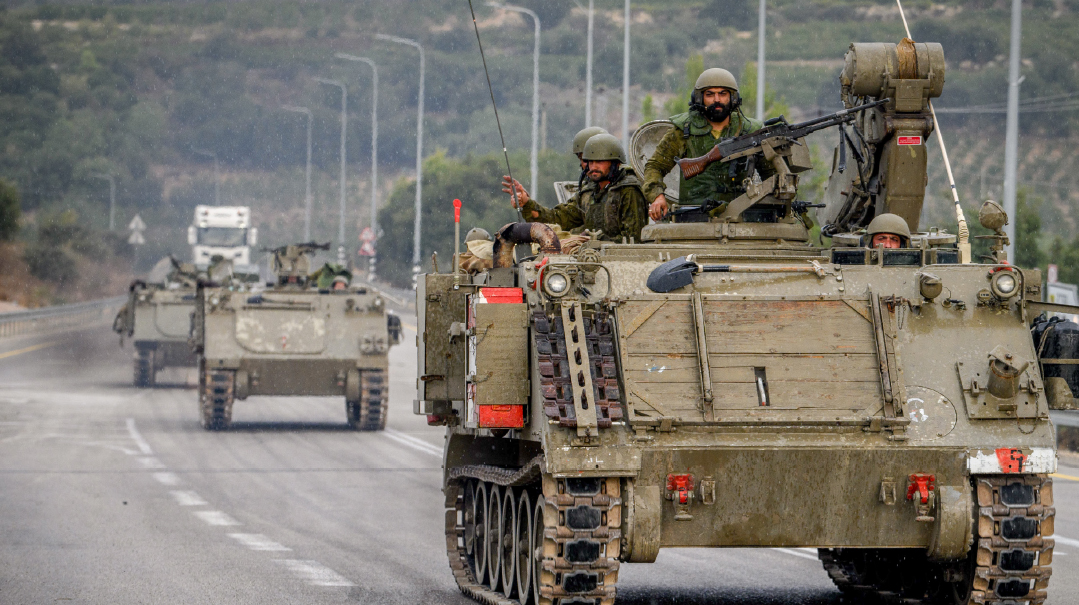
Full Support, Full Stop
Israel is still paying a heavy price for the concessions Prime Minister Ariel Sharon made in 2005. He unilaterally withdrew the IDF from Gaza, expelling some 9,000 Jews and handing over the thriving agricultural industry they had built in Gush Katif following Israel’s conquest of the Strip in the June 1967 Six Day War.
Measuring around 141 square miles, Gaza is about twice the size of Brooklyn and shares a border with Egypt. Gaza has always been a thorn in Israel’s side. The Philistines ruled there, and their first act of terror was to plug up the wells that Yitzchak Avinu dug.
One year after the disengagement, a Hamas slate defeated the Palestinian Authority in parliamentary elections, and by 2007, the terror group had seized total control from PA paramilitary forces in Gaza. Since then, Hamas has used Gaza as a platform for its terrorist infrastructure, firing tens of thousands of rockets and mortars at Israel. The IDF has fought back with aerial and artillery attacks, but in three major battles, it has been reluctant to send ground troops back to Gaza, with all the attendant risks.
“When I was national security advisor, Israel’s overall policy was to do only what we had to do to stop firing rockets from Gaza,” said Eyal Hulata, who served in that capacity during Naftali Bennett’s brief stint as prime minister. “Now all options are open. I would assume reconquering and reoccupying all of Gaza is not in the cards, but I would assume that we will send in ground forces at a magnitude that we haven’t seen in previous battles.”
One reason the IDF has refrained from a major ground operation in Gaza is the perception that Israel’s liberal left wing, which is a controlling force in the media and public opinion, would vehemently oppose it, but another former national security advisor contends the sheer barbarity of the Hamas attack has changed that narrative.
“There will be full support from public opinion for whatever the government decides to do to defend the lives of Israeli civilians,” said Major-General (res.) Giora Eiland, who also fought in the Yom Kippur War, participated in the rescue of 103 Jewish hostages at Entebbe in 1976, and served as a battalion commander during the 1982 Lebanon War.
Eiland contends that Israelis will put their differences aside for now, including the deep divisions prompted by the government’s effort to enact judicial reforms.
“Israeli has been preoccupied with domestic matters that are not crucial to the state, but we are more unified today than we were yesterday,” Eiland said.
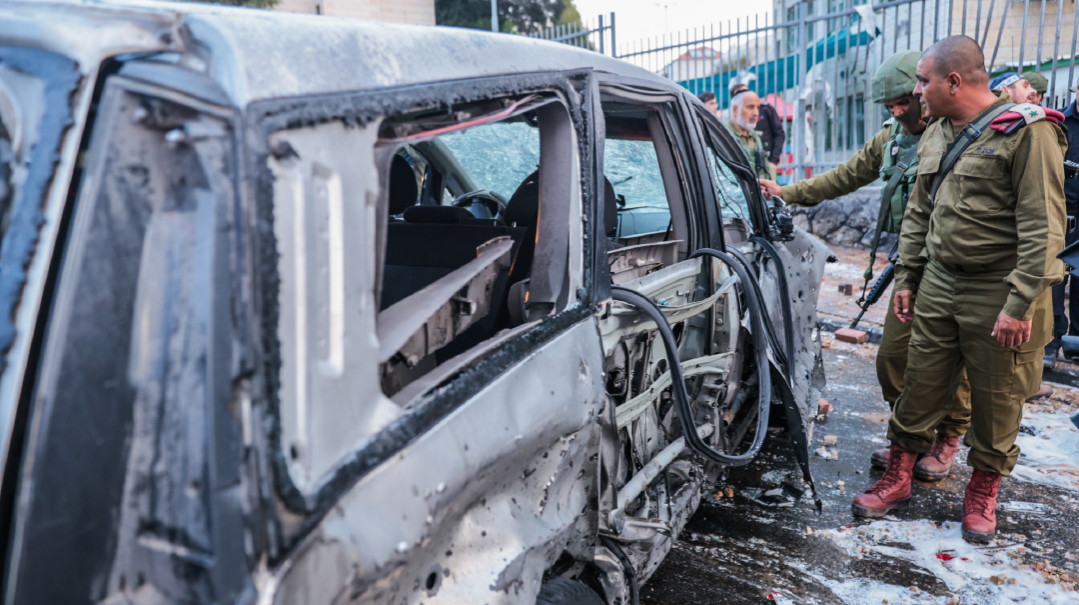
Intelligence Failures, Again
While this is time to close ranks and support the soldiers who are risking their lives and politicians who are navigating through a multidimensional crisis, the Israeli public is restless, and the media is rightly inquisitive and skeptical.
Everyone is asking how a few hundred terrorists could surprise the IDF, one of the most powerful armed forces in the world. It’s a fair question, and it has to be posed now to ensure that the intelligence community gets it right as the upcoming battles rage.
Asked about this epic failure, Giora Eiland pushed back, saying that five months ago, no one was questioning Israeli intelligence when it targeted and destroyed much of the Palestinian Islamic Jihad’s infrastructure in Gaza in a few short days.
“We have full intelligence superiority from the air,” Eiland said. “We have pictures 24/7 of anything that moves in Gaza. But I agree the fact that Israeli intelligence didn’t have advance knowledge of this attack is a very surprising failure and someone will have to explain what happened.”
However, intelligence gathering is just one part of the process. It’s how you interpret and apply it in real time that makes the difference between life and death.
In the Yom Kippur War, IDF intelligence saw Egyptian and Syrian maneuvers but was convinced they would not risk an attack that would lead to a certain defeat.
What the IDF didn’t consider then is that victory and defeat are in the eye of the beholder. The Egyptians’ goals were limited, and they declared victory based on their gains from the opening salvos of the war, just as Hamas is parlaying their current initial gains into a major propaganda victory.
Israel’s enemies have also gotten used to politicians and generals blustering about the “long arm of the IDF” and rarely backing it up with action.
Three months ago, Hezbollah erected two tents on Israel’s side of the northern border on Har Dov, where biblical archaeologists say G-d appeared to Avraham Avinu at the Bris ben Habesarim, promising an eternal covenant between Him and the Jewish People.
Instead of sending an IDF force to evacuate the tents immediately, the Netanyahu government opted to appeal to the Biden administration and UNIFIL — the UN unit ostensibly deployed to keep Israeli and Hezbollah forces apart. Hezbollah graciously agreed to remove one of the tents, and Israel finally struck the remaining one this week after Hezbollah lobbed mortars across the border, but such Israeli vacillation just telegraphs weakness.
The deal that the Bennett-Lapid government signed in its waning days through US mediation to cede territorial waters in the Mediterranean potentially rich in oil and gas to Hezbollah also emboldened Israel’s enemies. It signaled that Israel will make unreciprocated concessions in the quest for peace. Likewise, the recent decision to increase the number of work permits for Gaza Arabs to enter Israel, in the hopes that improved economic conditions would be a disincentive to terror, has backfired.
“There are many things we need to question, but neither this government [i.e., Netanyahu’s] nor the previous government were under any illusions that giving them work permits would change their motivations or calculations,” Hulata said.
At press time, two key Knesset committees — the Foreign Affairs and Defense Committee and the Subcommittee for Intelligence and Security Services — convened to discuss the latest developments. It came on a day when the lead story in the New York Times featured the Biden administration’s concern that Israel was caught flatfooted, and that maybe the US has overrated Israel’s intelligence capabilities, even though there is no sign that the US had any clue either.
Asked how Israel could continue to prosecute a war while shying away from reviewing the intelligence failures, Knesset member Danny Danon, a member of the Foreign Affairs and Defense Committee, took a nuanced view.
“I agree we have to look into what happened and learn from that, but we don’t have to deal with the blame game while we fight,” said Danon, who has been making the rounds in the foreign media to raise international support for Israel’s next steps.
Asked if this military battle will come to a premature end like all of its predecessors if civilian casualties in Gaza get out of hand, or if the political echelon loses its will, Danon contends this time will be different.
“We are fighting for our survival,” Danon said. “We have seen the barbarism and the war crimes Hamas committed against innocent civilians. We have no other choice but to eradicate Hamas. There will be no cease-fire and no negotiations.”
While the international community has universally sided with Israel in the early days of this campaign, and the US Navy dispatched a warship to the region, such support is often fleeting. Danon, who also served as Israel’s ambassador to the United Nations, knows this better than anyone.
“We appreciate their support today, but we will need it more in a few weeks,” he said, adding that Israel can count on the US this time around. “They know we’re fighting the same evil and radical ideas they had to fight after 9/11 with Al-Qaeda and ISIS. It takes time and requires determination.”
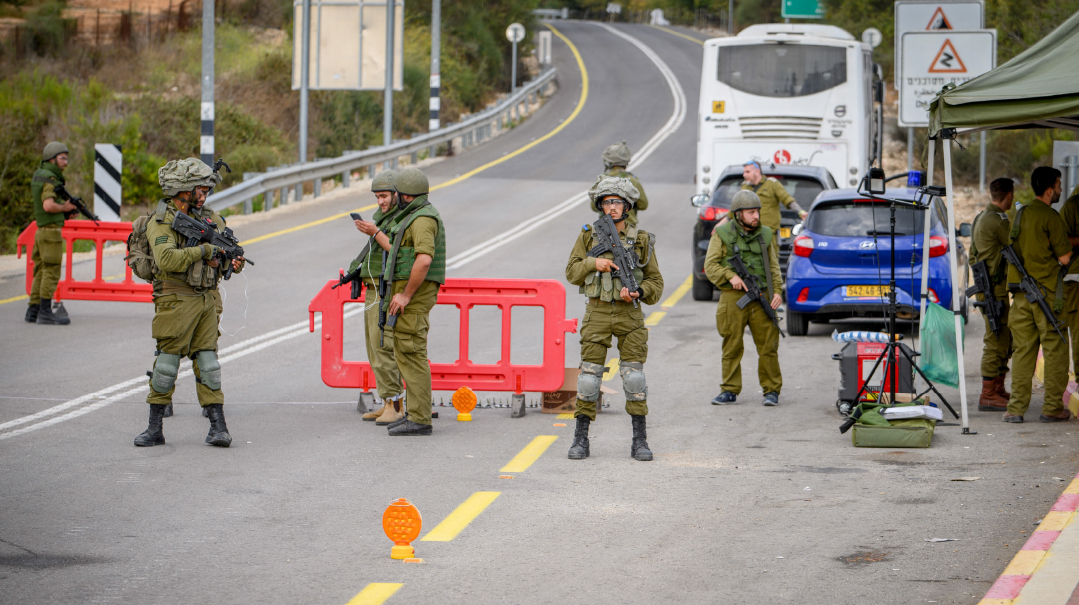
Victory over Tyranny
Despite Danon’s optimism, and assuming the international community will soon start standing over Israel with a stopwatch, how likely is Israel to prevail, and what would a military victory look like? And how will recent events impact talks for a normalization pact with Saudi Arabia?
Giora Eiland contends that this war must include all measures needed to win, including shutting all passages to and from Gaza, halting supplies of fuel, food, and water, and attacking all military targets and infrastructure, including communications systems, bridges, and energy installations.
Indeed, Defense Minister Yoav Gallant announced shortly before press time that Gaza would be subjected to a complete closure, with no electricity service or food or fuel deliveries.
Eiland also said it was important that Israel deliver a response so crushing that it would deter anyone else from opening a second front.
He said the Iranians made a clear decision six months ago, based on their conception of Israel’s political weakness, to stoke a regional war in which all the forces subordinated to Iran, including its militias in Syria, Hezbollah, and Hamas, would attack Israel simultaneously.
“I don’t see any signs of this happening, nor do I think Israel has any interest at the moment in opening another front, but this depends more on the ambitions of the other side,” Eiland said.
As to normalization with Saudi Arabia, Eiland contends these are two separate but interrelated issues. “The Palestinians have now reminded us that no matter what political deals we reach with other countries, they live here too, and the Israeli-Palestinian conflict can’t be solved by agreements with others.”
Yaakov Amidror agrees with the decision to cut supplies to Gaza and said humanitarian considerations are irrelevant. “I don’t remember even one example from history that a Western country helped its enemy during a war,” Amidror said.
His conception of an Israeli victory includes destroying Hamas’s entire military infrastructure, which will require ground forces. “It cannot be done only by the air force or with artillery,” Amidror said. “Victory also means Hamas no longer can reattack Israel, and that Israel will be free to destroy everything that Hamas does to rebuild its capabilities.”
Does that involve reconquering and reoccupying Gaza?
“This is a military question that the professionals will have to consider,” Amidror said. “They have to ask themselves how they can achieve this target, and whether that will require conquering all or part of the Gaza Strip.”
And if they do, what happens to civilian life in Gaza after widespread destruction, and who rules Gaza next?
“It’s their problem,” Amidror said. “They will have to make the choice. There are two million people in Gaza, and if they want to live in destroyed areas like parts of Somalia, it’s their decision, and at the end of the day, they can decide to get rid of Hamas.”
Amidror also contends that Saudi Arabia and other Muslim nations who are considering relations with Israel and who are also both frightened by Iran and their terrorist proxies are watching closely to see how Israel emerges from this.
“If Israel succeeds in destroying Hamas in this operation, and they see that when it came to a real test, Israel was ready to fight and ready to pay the price, everyone in the Middle East, not just the Saudis will appreciate us,” Amidror said. “If our reaction is not strong enough, we might lose support in the Middle East.”
One major concern that could impact Israel’s decision on how to retaliate is the fact that Hamas has taken Jewish hostages with them to Gaza, and according to some reports in the foreign press, has divided them up and is using them as human shields to deter Israeli attacks. Eyal Hulata says this is both devastating for Israel and will end up being devastating to Hamas as well.
“We need to take them back, one way or another,” Hulata said, adding that he believes the cabinet is considering a ground operation to reconquer Gaza, and that if he were still national security advisor, he would like to see such an option and compare it to other choices.
“If this ends in the full conquest of Gaza — and this may happen — this is an option we need to keep, because we can’t play according to the rules of the previous game,” he said, expressing confidence that the IDF would recover from its initial setbacks.
“Certainly, there has been a devastating surprise and people have questions about the capability of the IDF to perform,” Hulata said. “But make no mistake, the lack of attention we had during the holiday does not represent the true capability and decisiveness the IDF has when we’re attuned, and now we’re attuned. We will see the response accordingly.”
(Originally featured in Mishpacha, Issue 981)
Oops! We could not locate your form.

